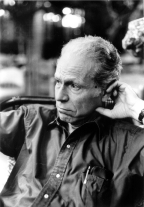 Maverick economist, Albert Otto Hirschman, was a world traveller: born in Berlin, educated in Paris, London and Trieste (where he obtained his Ph.D.), fought in the French Army in 1940, emigrated to the United States in 1941, stayed two years at Berkeley, joined the US Army, joined the Federal Reserve in Washington in 1946, lived in Bogota, Colombia from 1952 to 1956, and then onto Yale, Columbia and Harvard before finally settling at Princeton in 1974.
Maverick economist, Albert Otto Hirschman, was a world traveller: born in Berlin, educated in Paris, London and Trieste (where he obtained his Ph.D.), fought in the French Army in 1940, emigrated to the United States in 1941, stayed two years at Berkeley, joined the US Army, joined the Federal Reserve in Washington in 1946, lived in Bogota, Colombia from 1952 to 1956, and then onto Yale, Columbia and Harvard before finally settling at Princeton in 1974.
Albert Hirschman lived in the grey zone between economic and political theory.
His first book (1945) outlined how economic power is often the handmaiden of political power between states. This helped engender a good degree of skepticism about the manner in which the Marshall Plan was conducted in Europe in the 1940s. It was in Colombia, however, that Hirschman began to formulate his better known theories of development. As outlined in his 1958 Strategy of Development, Hirschman revolted against the importation and application of conventional economic doctrinal prescriptions for economic development. Rather, he insisted that economic development should be analyzed on a case-by-case basis, exploiting indigenous resources and structures to achieve the desired results. Imposing a unifrom doctrinal structure, regardless of local circumstances, Hirschman argued, was a sure-fire recipe for disasterous development.
Developed and underdeveloped economies, Hirschman argued, had “hidden rationalities” and it is the job of the development economist to exploit these and harness development planning to them. Hirschman’s “forward and backward linkages” concept has been one of the most used terms in economic development theory since. In a sense, then, Hirschman anticipates (or follows) the doctrinal imperialism of economic theory in the Chicago vein.
Hirschman’s study of the interaction of consumer sovereignty and competitive structure led to his other famous book, Exit, Voice and Loyalty (1970).
Major works of Albert Otto Hirschman
– National Power and the Structure of Foreign Trade, 1945
– Devaluation and the Trade Balance: A note, 1949
– The Strategy of Economic Development, 1958
– Journeys Towards Progress, 1963
– Development Projects Observed, 1967
– Exit, Voice and Loyalty: Responses to decline in firms, organizations and states, 1970
– A Bias for Hope: Essays on development and Latin America, 1971
– The Passions and the Interests: Political arguments for capitalism before its triumph, 1977
– Essays in Trespassing: Economics to politics and beyond, 1981
– Shifting Involvements: Private interest and public action, 1982
– Rival Interpretations of Market Society: Civilizing, destructive or feeble?, 1982

Saved as a favorite, I really like your blog!